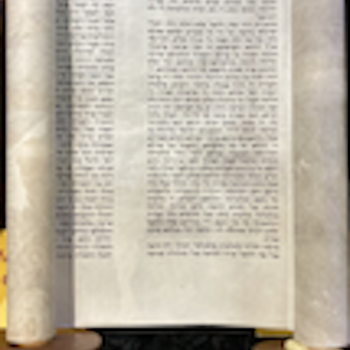When examining a particular gospel saying of Jesus, we should not only consider its immediate context but also anything else Jesus’ said about that subject or some specific word in his New Testament corpus, that is, in his entire gospel sayings. An example is Jesus’ pronouncement about the word “Paradise” to one of the two men who were crucified with him.
All four New Testament gospels record that Jesus was crucified between two other men (Matt. 27.38; Mark 15.27; Luke 23.33; John 19.18). In the gospels of Matthew and Mark, the King James Version says they were “thieves.” This has been what Christian tradition has said, but this is surely wrong. It would be an extremely harsh penalty for the state to put people to death for thievery. In fact, in the Roman Empire theft was not a capital crime except for slaves. So, the two men who were crucified with Jesus were surely guilty of a crime greater than stealing.
In the Greek New Testament, Matthew and Mark identify these two men crucified on either side of Jesus as lestes. The foremost Greek lexicon, Bauer’s Greek-English Lexicon of the New Testament and Other Early Christian Literature (2nd ed., p. 473, emphasis his), provides two meanings for lestes: (1) “robber, highwayman, bandit,” and (2) “revolutionary, insurrectionist.”
Of course, in any language, when a word has multiple meanings the context in which that word is used is the primary factor that should be considered in determining the meaning that its author intended. Since the Roman Empire only crucified slaves for robbery, and the two men crucified with Jesus were not slaves, Matthew and Mark must have meant these two men were revolutionaries and thus insurrectionists. The foremost insurrectionists in Israel during the time of Jesus were the Zealots. Their goal was the overthrow the Roman Empire’s subjection of Israel, and they believed in using violence to accomplish this goal. One of Jesus’ twelve apostles must have been a former Zealot since he is called “Simon the Zealot,” who was distinguished from “Simon, who is called Peter” (Matt. 10.2, 4 NASB).
It makes sense that the Romans condemned these two men crucified with Jesus as insurrectionists since insurrection was the crime for which Pilate condemned Jesus. We know this to be a fact because the Romans often put a headboard on the vertical post just above the crucified victim’s head with the written charge against that person. All four New Testament gospels say this was done with Jesus, and the writing included the words, “THE KING OF THE JEWS” (Matt. 27.37; Mark 15.26; Luke 23.38; John 18.19), thereby sarcastically charging Jesus as an insurrectionist. So, in Jesus case he was not guilty of murder; but the two men crucified with him probably were murdering revolutionaries. This becomes more apparent from the remark of one of these two men crucified with Jesus.
All four NT gospels say the Jewish religious leaders mocked Jesus as he hung upon the cross. Mark adds, “Those who were crucified with him also taunted him” (Mark 15.32). But we read of Jesus in Luke 23.39–43 that, it seems sometime afterwards,
One of the criminals who were hanged there kept deriding him and saying, “Are you not the Messiah? Save yourself and us!” But the other rebuked him, saying, “Do you not fear God, since you are under the same sentence of condemnation? And we indeed have been condemned justly, for we are getting what we deserve for our deeds, but this man has done nothing wrong.” Then he said, “Jesus, remember me when you come into your kingdom.” He replied, “Truly I tell you, today you will be with me in Paradise.”
Surely a penitent criminal would not say that of his and the other criminal’s condemnation unless both of them were guilty of premeditated murder.
But what did Jesus mean in saying to the penitent criminal, “today you will be with me in Paradise”? Some people have thought the comma is traditionally misplaced in English Bible versions. They claim it should be placed after the word “today” rather than before it. So, they would have it read, “Truly I tell you today,” in which Jesus was noncommittal on the time when he and the criminal would be in Paradise. They make this assertion because this reading allows for Jesus to mean the Paradise he was talking about was located in heaven and that Jesus would soon take the soul of this penitent criminal to heaven.
Now, ancient Greek manuscripts of the New Testament were produced in uncials, which are all capital letters. Upper and lower case did not come into existence in any language until sometime later. Also in these manuscripts there is no space between letters or any punctuation. Thus, textual critics who compile a Greek New Testament must make many decisions about punctuation. In this case, all distinguished textual critics in modern times locate the comma before the word “today” in Luke 23.43. The foremost, and very compelling, reason is that in the several sayings of Jesus in which introduced a profound concept with the phrase, “Truly I tell you,” or words translated to that effect, he never added the word “today” at the end of that phrase.
So, Jesus surely meant in Luke 23.43 that both he and the criminal would die that day and their souls immediately would go to “Paradise.” We cannot discern this for certain from Jesus’ remark here, but we can by asking if the corpus of Jesus’ gospel sayings have anything about what would happen to him immediately after he died. We discover there is one verse about it, and in recognizing it we will consider Jesus’ lone remark about “Paradise” in the context of all of his gospel sayings.
Of all the New Testament gospel authors, only Matthew says Jesus revealed where he immediately would be after his death by comparing it to what happened to the Prophet Jonah. Matthew reports in Matt. 12.38-40 about Jesus, “Then some of the scribes and Pharisees said to him, ‘Teacher, we wish to see a sign from you.’ But he answered them, ‘An evil and adulterous generation asks for a sign, but no sign will be given to it except the sign of the prophet Jonah. For just as Jonah was three days and three nights in the belly of the sea monster, so for three days and three nights the Son of Man will be in the heart of the earth.’” Jesus obviously did not refer to his dead body since it would not be buried in the earth but lie on a ledge in a tomb. So, Jesus must have been talking about his soul, saying it literally would be in the heart of the earth between the time of his death and his resurrection. And the “three days and three nights” is a Semitic idiom referring to “third day,” implying that he would not be there any longer since he would be raised from the dead on the third day.
During the time of Jesus, most Jews believed their Jewish Bible (Old Testament) indicated that when a human being dies, that person’s soul immediately goes down deep inside the earth to a place called “Sheol.” This word Sheol appears sixty-seven times in the Hebrew Bible, and it refers to “the place of the dead.” The Hebrew Bible tells much more about it, and what it is like in Sheol, than the New Testament does. Many pagans in antiquity thought likewise, and they also called it “the underworld.” Greeks also called it “Hades,” which is sometimes translated “hell.” In fact, hades appears in the Greek New Testament twelve times, and eleven of these instances are in the sayings of Jesus. Thus, Jesus called Sheol “Hades/hades,” and he meant that when he died his soul would go to Sheol/Hades.
There is one other time that Jesus said something about what happens to people immediately after death. Only Luke records it—a parable in Luke 16.19–31 (NASB throughout)—about a rich man and a poor man named Lazarus. Jesus first implies that the rich man was not benevolent to Lazarus, who often lay destitute at his gate.
It is important to understand that, although Luke does not say Luke 16.19–31 is a parable—which is always a fictitious story—scholars unanimously believe that it is. Jesus said, “the poor man died and he was carried away by the angels to Abraham’s bosom; and the rich man also died and was buried. And in Hades he lifted up his eyes, being in torment, and saw Abraham far away, and Lazarus in his bosom” (vv. 22–23). This rich man and Abraham then conversed. He asked Abraham to send Lazarus to “dip the tip of his finger in water and cool of my tongue; for I am in agony in this flame” (v. 24). Abraham included in his answer, “between us and you there is a great chasm fixed, in order that those who wish to come over from here to you may not be able, and that none may cross over from there to us” (v. 26). The rich then man asked Abraham to have Lazarus rise from the dead, go to his brothers’ house, and warn them of the torment in Hades. Abraham answered, “If they do not listen to Moses and the Prophets, neither will they be persuaded if someone rises from the dead” (v. 31). Herein, Jesus may have implied the later, general response of Jews to his own resurrection from the dead.
There has been much discussion about this Lukan parable as it regards the so-called “intermediate state,” that is, the time between death and resurrection. Caution is advised when considering whether or not all details in Jesus’ parables reflect reality. Jesus seems to have taught in this parable some reality about the intermediate state.
Jews had varying beliefs about the intermediate state. During the time of Jesus, most Jews in Israel believed in the existence of Sheol/Hades as a place where human souls go after death to await resurrection, just as I think their scriptures state. Some Jews believed that souls at this time were conscious, and others did not believe this. Some Jews also believed that Sheol/Hades was divided into two compartments, with righteous souls residing in “Abraham’s bosom” and unrighteous souls existing in another place separated from Abraham’s bosom, as Jesus says in this Lukan parable.
In the parable of the rich man and Lazarus, what Jesus called “Abraham’s bosom” is probably synonymous with the “Paradise” he mentioned to the criminal on the cross. In this parable, Jesus also related that Abraham told the rich man in Hades, “during your life you received your good things, and likewise Lazarus bad things; but now he is being comforted here, and you are in agony” (v. 25). This, too, reflects some Jewish belief about the intermediate state at that time. The words Abraham’s bosom and Paradise certainly conjure thoughts of comfort, security, and blessing.
Is there any more we can learn about Jesus’ mention of the word “Paradise” to the criminal crucified with him? This word is the English rendering of the Greek word paradeisos, which means “park” or “garden.” And the Persians had a similar word, pairidaeza, which meant literally “beyond the wall,” referring to a walled enclosure. Ancients had beliefs about a Paradise on earth, in heaven, and sometimes both.
Some Christians, especially those who are theologically Dispensational, have said that in Ephesians 4.8–10 the Apostle Paul indicates Jesus’ emptied Abraham’s bosom of all of its righteous souls and took them with him when he ascended to heaven (cf. Acts 1.9). In Ephesians 4.8, Paul quotes King David in Psalm 68.18, in which he depicts God as a conquering hero taking captives with him as he ascends high up. Paul applies this concept to Jesus and explains parenthetically, “When it says, ‘He ascended,’ what does it mean but that he had also descended into the lower parts of the earth? He who descended is the same one who ascended far above all the heavens, so that he might fill all things” (Ephesians 4.9–10). It is due to such texts that the Apostles’ Creed says of Jesus, “he descended into hell,” which refers to Hades. But this Ephesian text says nothing about Jesus taking righteous souls in Hades with him to heaven. Moreover, such a concept renders the future resurrection of the righteous dead as anti-climatic if not unnecessary.
We must cast the dragnet farther to gather up all of Jesus’ canonical sayings. For, when we think of the full corpus of the New Testament sayings of Jesus, we are accustomed to thinking only of those in the four gospels. But there are two entire chapters of sayings uttered by the heavenly-exalted Jesus in Revelation 2–3. They represent messages to seven churches located in Asia Minor, which is western Turkey today. Each message provides commendation, condemnation, or both to each church and then mentions a specific reward to be given in the afterlife to those who conquered that deficiency.
For instance, in the first message, which is addressed to church at Ephesus, Jesus says, “To everyone who conquers, I will give permission to eat from the tree of life that is in the paradise of God” (Revelation 2.7). This is reminiscent of the story about the Garden of Eden, when God made Adam and placed him there with “the tree of life also in the midst of the garden, and the tree of the knowledge of good and evil” (Genesis 2.9). Some Jews and other ancients also identified this place as “Paradise.”
But many ancient peoples also identified heaven, or some place in heaven, as “Paradise.” For example, the Apostle Paul surely refers to himself when he relates modestly, “I know a person in Christ who fourteen years ago was caught up to the third heaven—whether in the body or out of the body I do not know; God knows. And I know that such a person … was caught up into Paradise and heard things that are not to be told, that no mortal is permitted to repeat” (2 Corinthians 12.2–4). So, Paul must have meant that Paradise is the third heaven or a place located in the third heaven. Mostly on the basis of this text, there has been much speculation as to whether or not Paul believed in a three-tier concept of earth’s atmosphere, the universe, and heaven or if he believed in three levels, or perhaps the common seven levels, in heaven. Regardless, Paul seems to indicate he believed in a place called “Paradise” in heaven.
The exalted Jesus’ mention of “the tree of life that is in the paradise of God” surely refers to the city of God mentioned in the last two chapters of Revelation. John the Revelator informs, “Then I saw a new heaven and a new earth; for the first heaven and the first earth had passed away, and the sea was no more. And I saw the holy city, the new Jerusalem, coming down out of heaven from God, prepared as a bride adorned for her husband” (Revelation 21.1–2). The remainder of the text makes it most obvious that John saw in vision the eschatological future, when God will come to dwell in this city with his people (v. 3). This heavenly Jerusalem is described here in much detail. For instance, John says, “Then the angel showed me the river of the water of life, bright as crystal, flowing from the throne of God and of the Lamb [Jesus] through the middle of the street of the city. On either side of the river is the tree of life with its twelve kinds of fruit, producing its fruit each month; and the leaves of the tree are for the healing of the nations” (Revelation 22.1–2). So, the tree of life that was in the Garden of Eden when God created man will be in the city of God in the eschaton.
In addition, the Bible seems to connect the Paradise in Sheol/Hades with the Paradise that is in, or is, that beautiful city of God that will come down from heaven toward earth in the eschaton. And the Bible seems to say that the people whose souls reside in Paradise in Sheol/Hades will someday be resurrected from the dead to reside forever in the Paradise that is in, or is, that holy city of God—new Jerusalem.












